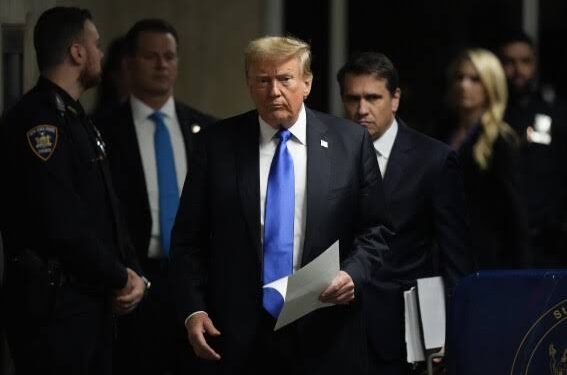By NPR
NEW YORK — Former President Donald Trump has been found guilty of 34 counts of falsifying business records to influence the outcome of the 2016 election, a historic verdict as Trump, the presumptive Republican presidential nominee, campaigns again for the White House.
This is the first time a former or sitting U.S. president has been convicted of criminal charges.
On Thursday, 12 New York jurors said they unanimously agreed that Trump falsified business records to conceal a $130,000 hush money payment to adult film star Stormy Daniels to influence the 2016 contest.
The decision came after about a day and a half of deliberations.
As the verdicts were read, Trump remained silent and still. But the former president spoke to reporters outside the courtroom, calling it a “rigged, disgraceful trial,” and said the “real verdict” will be rendered on Election Day.
Trump’s legal team signaled it would appeal the conviction.
New York Judge Juan Merchan set sentencing for July 11 — just four days before the start of the Republican National Convention. Trump faces a maximum sentence of up to 4 years in prison, but as a first-time, white-collar offender, no jail time is necessary, and he could receive probation instead.
The jury heard from 22 witnesses during about four weeks of testimony in Manhattan’s criminal court. Jurors also weighed other evidence — mostly documents like phone records, invoices and checks to Michael Cohen, Trump’s once loyal “fixer,” who paid Daniels to keep her story of an alleged affair with the former president quiet.
The facts of the payments and invoices labeled as legal services were not in dispute. What prosecutors needed to prove was that Trump falsified the records in order to further another crime — in this case violating the New York election law that makes it a crime for “any two or more persons who conspire to promote or prevent the election of any person to a public office by unlawful means.” The jurors were able to choose whether those unlawful means were violating the Federal Elections Campaign Act, falsifying tax returns, or falsifying other business records.
Trump’s defense focused intently on the credibility of Cohen, and argued that influencing an election is not illegal.
The verdict came more than a year after a grand jury indicted Trump, on March 30, 2023, marking the first time a former or sitting president faced criminal charges.
Republicans quickly dismissed the indictment as an overreach of power by Democratic District Attorney Alvin Bragg, who had brought the charges.







Discussion about this post